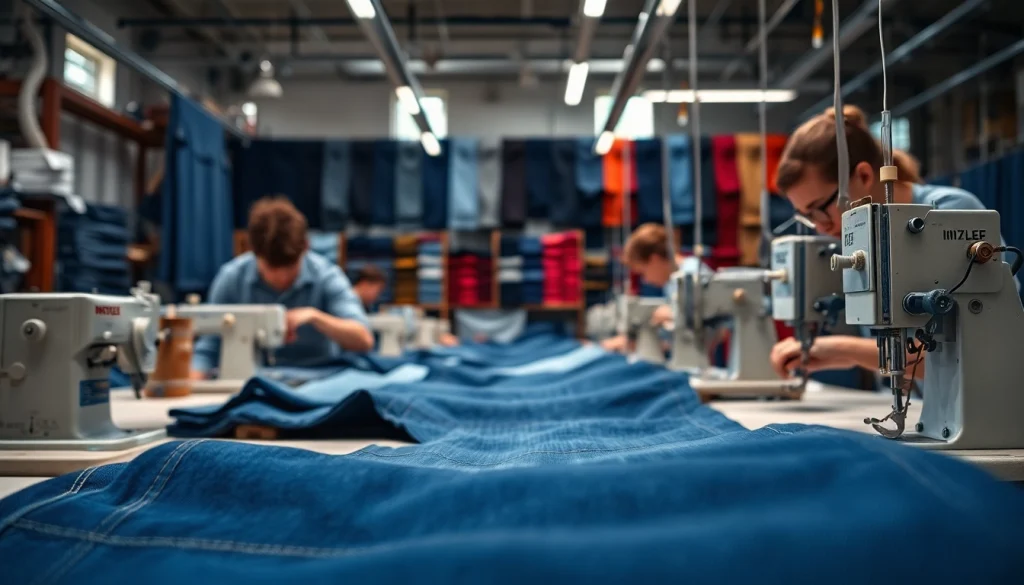Understanding the Role of Jeans Factory Manufacturers
In the world of fashion, jeans have become a staple garment, transcending age, gender, and personal style. However, the journey of jeans from concept to closet is complex and involves various professionals, among which jeans factory manufacturers play a pivotal role. Understanding their functions, qualities, and the challenges they face is crucial for brands looking to create high-quality denim products that stand out in a competitive market.
What Defines a Jeans Factory Manufacturer?
A jeans factory manufacturer is not merely a production unit; it encompasses a comprehensive ecosystem responsible for turning raw materials into finished denim products. This includes everything from fabric selection and cutting to sewing and finishing. Manufacturers vary in scale from small, boutique operations to large, industrial facilities capable of producing thousands of garments daily. Each manufacturer passes through stages that include:
- Material Sourcing: Choosing high-quality denim fabrics, thread, and hardware like buttons and zippers.
- Design Implementation: Adapting design specifications provided by brand partners to create prototypes and final products.
- Production Management: Overseeing the entire production process, ensuring timelines are met without compromising quality.
- Quality Control: Implementing rigorous checks throughout the manufacturing stages to guarantee that the end products meet the required quality standards.
The Importance of Quality in Denim Production
Quality in denim production cannot be overstated. A well-manufactured pair of jeans can significantly affect customer satisfaction, brand reputation, and ultimately, sales. Here are key aspects of quality in denim production:
- Fabric Durability: High-quality denim withstands wear and tear, maintaining its form and function over time.
- Stitching Precision: Attention to detail during stitching ensures that seams are strong and neat, contributing to the overall aesthetic of the jeans.
- Finishing Touches: Effective washing, distressing, and other finishing techniques influence both feel and appearance, thus affecting consumer perceptions.
How Jeans Factory Manufacturers Influence Fashion Trends
Jeans factory manufacturers are not just technical producers; they are trendsetters in the denim industry. Their capabilities to innovate fabrics and techniques play a significant role in shaping current fashion trends. This includes:
- Innovative Fabric Development: The introduction of stretch denim, eco-friendly fabrics, and unique washes can create new market opportunities.
- Collaboration with Designers: Many factories work closely with fashion designers to produce limited-edition collections that push the boundaries of traditional denim.
- Responsiveness to Consumer Preferences: Successful manufacturers keep a pulse on consumer desires, allowing them to adapt quickly to changing tastes and preferences.
Key Features to Look for in Jeans Factory Manufacturers
When businesses are selecting jeans factory manufacturers, several key features should be prioritized to ensure a successful partnership that aligns with their brand values and customer expectations.
Production Capacity and Scalability
Understanding the production capacity of a manufacturer is vital. A competent jeans factory should readily meet small-batch and large-scale production requirements. Here are important considerations:
- Minimum Order Quantities (MOQ): Brands need to ascertain the MOQ for small startups versus larger companies, ensuring that it suits their business model.
- Flexibility: The ability to scale production up or down based on market demand is essential for businesses that may experience fluctuations in sales.
Customization Options for Brands
Today’s consumers expect a unique fit and style. As such, customization options are increasingly relevant. Look for features such as:
- Fabric Choices: A diverse range of fabric options allows brands to offer unique products that stand out.
- Tailored Designs: The possibility to customize cuts, washes, and finishes is invaluable, enabling brands to meet specific market niches.
Compliance with Quality Standards
Compliance with industry standards such as ISO certifications and adherence to environmental regulations is crucial in today’s market. Brands should ensure their partners:”)
- Safety Standards: Factories should uphold safety standards not only in production but also in worker conditions and environmental impact.
- Quality Control Protocols: A reliable quality assurance system ensures that products consistently meet desired specifications.
Evaluating Ethical Practices of Jeans Factory Manufacturers
As consumer awareness of ethical practices grows, companies must consider the ethical standing of their factories. Transparency, sustainability, and fair labor practices are becoming non-negotiable.
Importance of Sustainability in Denim Production
With growing global concerns about environmental impact, sustainability in denim production is paramount. Brands should evaluate:
- Eco-Friendly Materials: Sourcing organic cotton, recycled denim, or sustainable synthetic fibers lays a strong environmental foundation.
- Water and Energy Usage: Sustainable factories utilize technologies that minimize water and energy consumption in production processes.
Fair Labor Practices in Manufacturing
Ensuring fair labor practices is essential for maintaining corporate responsibility. Brands should strive to partner with factories that:
- Uphold Workers’ Rights: Compliance with labor laws to provide fair wages, benefits, and working conditions can enhance brand loyalty and image.
- Invest in Workforce Development: Factories that offer training and development can contribute positively to both employee satisfaction and productivity.
Transparency in Sourcing Materials
Consumers increasingly demand transparency regarding where and how materials are sourced. Brands should inquire about:
- Supply Chain Visibility: A transparent supply chain allows brands to assure consumers of the integrity of their products.
- Ethical Sourcing Certifications: Passports or certificates for materials can validate ethical sourcing practices.
Challenges Faced by Jeans Factory Manufacturers
The landscape of jeans manufacturing is not without its challenges. Manufacturers must navigate various hurdles that can impact production efficiency and product quality.
Supply Chain Disruptions and Problem-Solving
Global events can disrupt the supply chain, from raw material shortages to logistical challenges. Effective problem-solving strategies include:
- Diversifying Suppliers: Working with multiple suppliers can mitigate risks associated with dependency on a single source.
- Implementing Technology: Utilizing technology for tracking inventory and predicting shortages can enhance supply chain resilience.
Adapting to Technological Changes
As technology evolves, manufacturers must adapt to remain competitive. This includes:
- Investing in Automation: Incorporating automation in production lines can improve efficiency and reduce labor costs.
- Staying Ahead of Industry Innovations: Engaging in continual training and staying updated on technological advancements keeps a manufacturer competitive.
Managing Consumer Expectations in Quality and Price
Balancing quality production with fair pricing is a persistent challenge. Brands should focus on:
- Value Proposition: Clearly communicating the value offered by quality products can justify higher prices in the market.
- Feedback Loops: Actively seeking consumer feedback allows manufacturers to adapt to expectations and improve products effectively.
Future Trends for Jeans Factory Manufacturers
The future of jeans manufacturing is shaped by innovation, sustainability, and evolving consumer demands. Brands need to stay informed about these trends to remain relevant.
Innovation in Denim Fabric Technology
Fabric technology continues to evolve, and manufacturers must keep pace. Look for trends that include:
- Smart Fabrics: Enhanced denim that incorporates technology, such as moisture-wicking or temperature control, can appeal to tech-savvy consumers.
- Development of Stretch and Recovery Materials: Innovations that enhance comfort without compromising the classic denim aesthetic will be highly sought after.
The Rise of Eco-Friendly Manufacturing Practices
As sustainability becomes a consumer priority, manufacturers that prioritize eco-friendly practices will lead the market. Options include:
- Closed-Loop Production: Implementing recycling processes where old jeans are converted into new products can reduce waste significantly.
- Sustainable Chemical Use: Utilizing eco-friendly dyes and finishing chemicals can minimize environmental impact while retaining product quality.
Global Market Dynamics and Their Impact on Production
The demand for jeans is often influenced by global economic trends, and manufacturers must be adaptable. Strategies should include:
- Market Research: Ongoing research helps manufacturers anticipate shifts in consumer behavior and adjust production strategies accordingly.
- Agility and Flexibility: A responsive production process that can pivot in response to market conditions will be essential for success.





